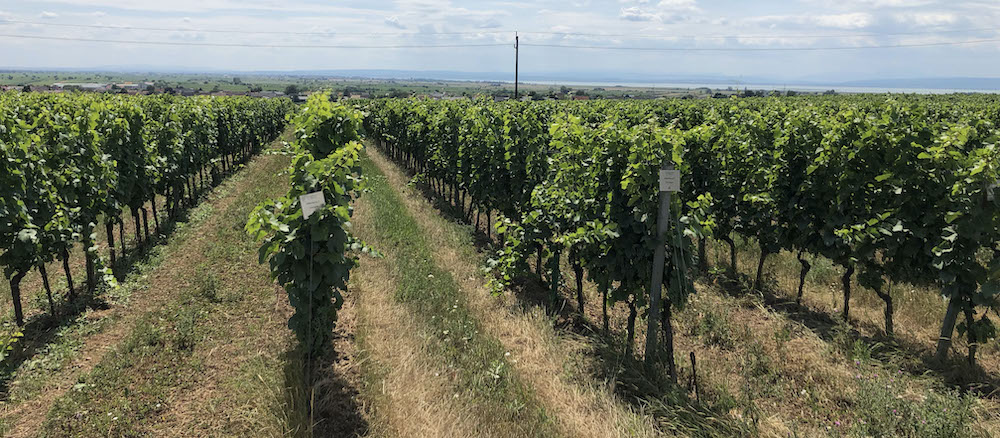
Gols, 11.7.2019
Natural, lively, genuine, true, raw, authentic, handmade?
Natural wines have no certification or clear rules. However, natural winemakers generally work purely naturally in both the vineyard and the cellar, without chemical products or any unnatural interventions in the wine. The wines are usually unfiltered, with little or no added sulfur. If a small amount of sulfur is added to the wine, it is always added to the finished wine before bottling, never during the fermentation or aging process.
The wines ferment spontaneously, i.e. without added yeast. They ferment only with the help of natural yeast that the grapes bring with them from the vineyard or that occurs naturally in the cellar. The wines ferment in wooden barrels, clay amphorae (kvevri), concrete eggs, and other special containers.
Essentially, natural winemakers are returning to their roots, when wine was grown and produced naturally without any unnatural interventions and in a purely natural way. Many of the best natural winemakers do not use any certification and follow only their own rules and instincts. Others are certified as organic or biodynamic, and these practices can often overlap.
The wines in our range start with at least organic certification. We only sell what we ourselves like to drink :-)
You can find the wines in our e-shop.
Differences between conventional, organic, biodynamic, and natural wine
Conventional (chemical) vs. natural (organic) wines. This issue is not as simple as it seems at first glance, and everyone should drink wines that they enjoy. At the same time, however, it is good to keep broadening your horizons and not shy away from unfamiliar styles, aromas, and flavors, because the best way to understand wine is to keep learning something new and different. At the same time, as great lovers of natural wines, we do not think that all natural wines are good and conventional wines are bad. In each of these sectors, there is a small percentage of the absolute best, a lot of average wines, and a large proportion of below-average wines. Everyone simply has to find their own way.
Natural wines are made by these winemakers, for example.
Classic (conventional) wines
Conventional winemakers work in vineyards and cellars with a lot of additives, often chemical ones. Pesticides, insecticides, and often herbicides are used in vineyards. In the cellar, a wide range of additives are used, such as artificial yeast, fining agents, artificial tannins, proteins, etc. Wines are sometimes acidified or sweetened (either with beet sugar or grape concentrate). Wines are often fermented at a controlled temperature, usually in stainless steel tanks.
A large amount of sulfur is used both in the vineyards and in the wine as a stabilizer. Overall, all of this can be compared to artificial flavor enhancers in food. Some wineries currently operate under a system known as integrated production, which is a kind of intermediate between conventional and organic production. However, even in this system, a lot of chemical products are still used.
Organic/ BIO wines
Winemakers who work organically are prohibited from using chemical products in their vineyards. The vineyards are mostly grassed and planted with various mixtures of herbs and plants. Simply put, the vineyard is alive, full of plants, insects, microorganisms, and various animals. Vineyards are treated with natural preparations, herbal mixtures, and extracts.
Unfortunately for organic wines, the rules only apply to work in the vineyard; what happens next in the cellar is not controlled. Therefore, similar preparations to those used in conventional wines can be used in wine production, and high amounts of sulfur can still be added to the wine. However, this is very individual, so some organic wines may be more similar to conventional wines, while others may be more similar to natural wines.
Biodynamic wines
Biodynamic agriculture is based on the teachings of Austrian philosopher Rudolf Steiner. In biodynamics, various homeopathic preparations, herbal and plant mixtures, and extracts are used in vineyards. The best known of these preparations are the so-called "horn manure" and "quartz manure." These preparations are obtained by burying cow manure or quartz in a cow horn in the vineyard. Biodynamics also makes extensive use of the positions of the planets and the phases of the moon. However, this is a very complex issue.
Any chemical preparations and artificial yeasts are then prohibited in the cellar. However, wines may be clarified and filtered. The addition of sulfur is also permitted, but in smaller doses than in organic farming.
Again, biodynamic winemakers work in different ways. Some strictly adhere to the rules and their wines are similar to conventional wines, while others only use some of the ideas from biodynamics and then work with the wine in their own way. Some orthodox natural winemakers also only recognize biodynamics in certain areas.
Biodynamics is currently widespread in Austria, France, and Italy. In the Czech Republic, we have only one certified biodynamic winery, Vinařství Kutná Hora in Bohemia. However, this is a good example of how the idea and certification alone are not everything, and these wines absolutely do not match the quality of their foreign competitors. The best-known certified biodynamic associations are Demeter, Respekt a Biodyvin.
Natural wines
Natural wines have no certification or clear rules. However, natural winemakers generally work purely naturally in both the vineyard and the cellar, without chemical preparations or any unnatural interventions in the wine. The wines are usually unfiltered, with little or no added sulfur. If a small amount of sulfur is added to the wine, it is always added to the finished wine before bottling, never during the fermentation or aging process.
The wines ferment spontaneously, i.e., without added yeast. They ferment only with the help of natural yeast that the grapes bring with them from the vineyard or that occurs naturally in the cellar. Wines ferment in wooden barrels, clay amphorae (kvevri), concrete eggs, and other special containers.
Essentially, natural winemakers are returning to their roots, when wine was grown and produced naturally without any unnatural interventions and in a purely natural way. Many of the best natural winemakers do not use any certification and follow only their own rules and instincts, while others are certified as organic or biodynamic, and these practices can often overlap.
Choose natural wines from different countries on our e-shop. Here you will find wines from Czech Republic, France, Austria, and others.
HokusPokus opinion box
We believe that natural wine is currently becoming a very popular trend around the world, and many winemakers who are not entirely natural are taking advantage of this. The fact that demand is constantly increasing and there is only a limited amount of truly top-quality wines means that the best natural wines are becoming unavailable and many customers have to settle for average wines.
In our opinion, true natural wine must come from organic vineyards, be fermented spontaneously, undergo absolutely no intervention in the cellar, including fining, and be bottled either completely without sulfur or with the addition of a minimal amount of sulfur before bottling.
Special category of natural wines – Orange wines
Orange wine is produced using a similar technology to red wine, but only from white grapes. The fermentation process takes place together with maceration. Maceration means that the wine ferments together with the grape skins. The wine thus takes the best from the pressed must and grape skins. Orange wines do not necessarily have to be a rich orange color. It depends on how long the maceration on the skins lasts and many other aspects. Orange wines are an unknown discipline for many, but here at HokusPokus winebar&tapas, they are among the most popular!







